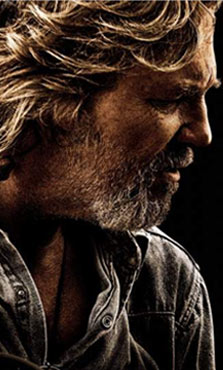 Early in “Crazy Heart” Jeff Bridges finds himself back in the familiar territory of a bowling alley. This time he’s Bad Blake, a country legend fallen on hard times, but in the garish pastels of the alley we’re treated to a thrilling reprise of Jeff Lebowski. Actor and role have merged indelibly; the same happened when John Travolta reminded us of Tony Manero when he broke into the twist at Jack Rabbit Slim’s in “Pulp Fiction”. Early in “Crazy Heart” Jeff Bridges finds himself back in the familiar territory of a bowling alley. This time he’s Bad Blake, a country legend fallen on hard times, but in the garish pastels of the alley we’re treated to a thrilling reprise of Jeff Lebowski. Actor and role have merged indelibly; the same happened when John Travolta reminded us of Tony Manero when he broke into the twist at Jack Rabbit Slim’s in “Pulp Fiction”.
In this opening scene Bridges is displaced from the role of Bad Blake just long enough to give the film the self-consciousness of a stunt: one of our very best actors is going to act the hell out of a role, and that’s exactly what he does. He fully embodies Blake. The musician holds our attention because of the string of little details Bridges makes us notice: the way he reaches for a latch that isn’t there on the door frame in his no-star hotel, pees in a plastic milk jug in his car, scrapes the unused coins off a phone booth tray, loses his glasses in a trash can he’s just thrown up in, balances a glass of whiskey on his belly in bed, and more. It’s one of Bridges’ best performances.
Big on character, short on plot, the movie exudes warm affection for country music and musicians in general. The portrait is warts and all, though. In one sequence, Blake is a drunken mess at the bowling alley right up until the moment he takes the stage. Then the professional takes over. Once the guitar’s in hand, his backing band in full force, we know he’s right at home. What’s telling is his sudden disappearance to the back alley to toss his cookies in a trash barrel, then his reappearance on the stage to finish the interrupted song. It’s embarrassing to watch, yet inspiring, too, because we see how the music galvanizes Blake with otherworldly strength and focus.
The scene in which our boozy minstrel writes a song lying on his back, in bed, is a wonderful glimpse into the intimate process of songwriting. Another side of his musicianship is precise technical know-how. There's a fine scene in which he bickers with a festival knob-twiddler to get his sound just right. Blake knows he’s being mildly sabotaged so the headliner will sound better, and sure enough he’s right. Aside from Blake, we also meet minor musicians who play with him along the way, such as a gifted New Mexico piano player for whom the sheer love of playing must compensate for a disheartening lack of money and fame.
Maggie Gyllenhaal is excellent as Blake’s love interest, Susie, a divorced mom who falls in love with the grizzled muso in spite of herself. “Crazy Heart” doesn’t waste a second dwelling on the oddity of this May—well, August—December romance, which is actually refreshing. The oddness of Blake and Susie’s attraction only makes the central part of the story more credible: Susie loves Blake's music, and under the sway of his music all contradictions are smoothed over.
For a time, at least. The bleak resolution of their affair is realistically handled, and rightly so. Blake’s second chance at love was incidental. His dalliance would never have ended otherwise. Susie’s role in Blake’s life is to steer him back into songwriting, revive his music-making genius. The ending isn’t quite happy, but it’s actually a fairly benign resolution considering Susie’s been little more than grist for Blake’s creative mill. She gets away relatively easy.
This too feels like an accurate sense of what music means for a man like Bad Blake. Creativity is a mysterious process, a career is just a series of accidents, and for one reason or another music is his only constant companion. The lack of a complicated plot in “Crazy Heart” serves the central theme very well. Everything falls away but the man and his music (and the actor and his role). “Crazy Heart” is a marvelous love letter to the power of music to sustain the life of an artist. For better or worse, 'til death do they part. |